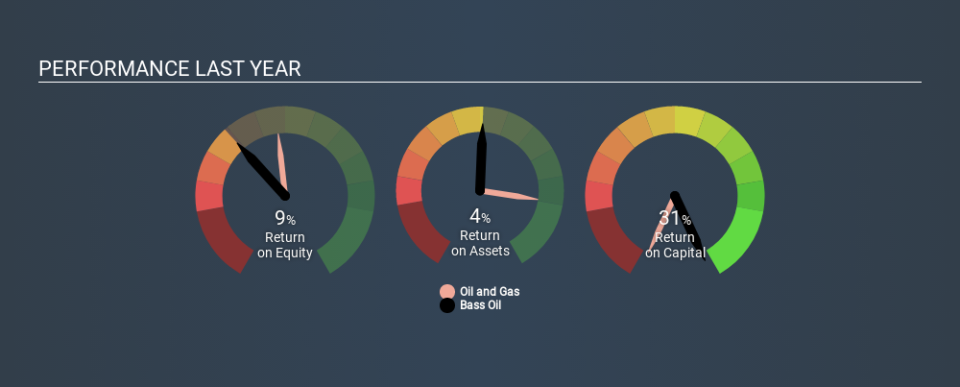Bass Oil Limited (ASX:BAS) Is Employing Capital Very Effectively

Today we'll evaluate Bass Oil Limited (ASX:BAS) to determine whether it could have potential as an investment idea. In particular, we'll consider its Return On Capital Employed (ROCE), as that can give us insight into how profitably the company is able to employ capital in its business.
Firstly, we'll go over how we calculate ROCE. Next, we'll compare it to others in its industry. Finally, we'll look at how its current liabilities affect its ROCE.
Return On Capital Employed (ROCE): What is it?
ROCE is a metric for evaluating how much pre-tax income (in percentage terms) a company earns on the capital invested in its business. All else being equal, a better business will have a higher ROCE. Ultimately, it is a useful but imperfect metric. Renowned investment researcher Michael Mauboussin has suggested that a high ROCE can indicate that 'one dollar invested in the company generates value of more than one dollar'.
How Do You Calculate Return On Capital Employed?
Analysts use this formula to calculate return on capital employed:
Return on Capital Employed = Earnings Before Interest and Tax (EBIT) ÷ (Total Assets - Current Liabilities)
Or for Bass Oil:
0.31 = US$375k ÷ (US$3.8m - US$2.6m) (Based on the trailing twelve months to June 2019.)
So, Bass Oil has an ROCE of 31%.
Check out our latest analysis for Bass Oil
Is Bass Oil's ROCE Good?
ROCE is commonly used for comparing the performance of similar businesses. Using our data, we find that Bass Oil's ROCE is meaningfully better than the 13% average in the Oil and Gas industry. We consider this a positive sign, because it suggests it uses capital more efficiently than similar companies. Regardless of the industry comparison, in absolute terms, Bass Oil's ROCE currently appears to be excellent.
Bass Oil reported an ROCE of 31% -- better than 3 years ago, when the company didn't make a profit. This makes us wonder if the company is improving. You can see in the image below how Bass Oil's ROCE compares to its industry. Click to see more on past growth.
It is important to remember that ROCE shows past performance, and is not necessarily predictive. Companies in cyclical industries can be difficult to understand using ROCE, as returns typically look high during boom times, and low during busts. This is because ROCE only looks at one year, instead of considering returns across a whole cycle. We note Bass Oil could be considered a cyclical business. How cyclical is Bass Oil? You can see for yourself by looking at this free graph of past earnings, revenue and cash flow.
What Are Current Liabilities, And How Do They Affect Bass Oil's ROCE?
Current liabilities are short term bills and invoices that need to be paid in 12 months or less. The ROCE equation subtracts current liabilities from capital employed, so a company with a lot of current liabilities appears to have less capital employed, and a higher ROCE than otherwise. To check the impact of this, we calculate if a company has high current liabilities relative to its total assets.
Bass Oil has current liabilities of US$2.6m and total assets of US$3.8m. Therefore its current liabilities are equivalent to approximately 68% of its total assets. Bass Oil boasts an attractive ROCE, even after considering the boost from high current liabilities.
The Bottom Line On Bass Oil's ROCE
In my book, this business could be worthy of further research. Bass Oil looks strong on this analysis, but there are plenty of other companies that could be a good opportunity . Here is a free list of companies growing earnings rapidly.
For those who like to find winning investments this free list of growing companies with recent insider purchasing, could be just the ticket.
If you spot an error that warrants correction, please contact the editor at editorial-team@simplywallst.com. This article by Simply Wall St is general in nature. It does not constitute a recommendation to buy or sell any stock, and does not take account of your objectives, or your financial situation. Simply Wall St has no position in the stocks mentioned.
We aim to bring you long-term focused research analysis driven by fundamental data. Note that our analysis may not factor in the latest price-sensitive company announcements or qualitative material. Thank you for reading.


